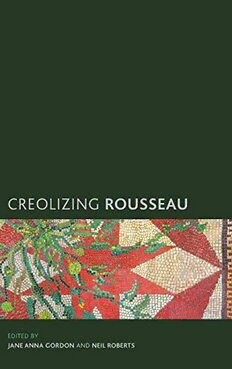Table Of ContentCreolizing Rousseau
.................18664$ $$FM 11-21-1413:22:01 PS PAGEi
CreolizingtheCanon
Serieseditors:JaneAnnaGordon,AssociateProfessorofPoliticalScience
andAfricanaStudies,UniversityofConnecticutandNeilRoberts,Associate
ProfessorofAfricanaStudiesandFacultyAffiliateinPoliticalScience,
WilliamsCollege
Thisseries,publishedinpartnershipwiththeCaribbeanPhilosophical
Association,revisitscanonicaltheoristsinthehumanitiesandsocialsciences
throughthelensofcreolization.Itoffersfreshreadingsoffamiliarfigures
andpresentsthecaseforthestudyofformerlyexcludedones.
CreolizingRousseaueditedbyJaneAnnaGordonandNeilRoberts
Hegel,FreudandFanonStefanBird-Pollan
.................18664$ $$FM 11-21-1414:51:40 PS PAGEii
Creolizing Rousseau
Edited by
Jane Anna Gordon
and Neil Roberts
London•NewYork
.................18664$ $$FM 11-21-1413:22:04 PS PAGEiii
PublishedbyRowman&LittlefieldInternationalLtd
UnitA,WhitacreMews,26-34StannaryStreet,LondonSE114AB
www.rowmaninternational.com
Rowman&LittlefieldInternationalLtd.isanaffiliateofRowman&Littlefield
4501ForbesBoulevard,Suite200,Lanham,Maryland20706,USA
WithadditionalofficesinBoulder,NewYork,Toronto(Canada),andPlymouth(UK)
www.rowman.com
Copyright(cid:2)2015byJaneAnnaGordon,NeilRobertsandcontributors
Allrightsreserved.Nopartofthisbookmaybereproducedinanyformorbyany
electronicormechanicalmeans,includinginformationstorageandretrievalsystems,
withoutwrittenpermissionfromthepublisher,exceptbyareviewerwhomayquote
passagesinareview.
BritishLibraryCataloguinginPublicationData
AcataloguerecordforthisbookisavailablefromtheBritishLibrary
ISBN:HB978-1-78348-280-1
PB978-1-78348-281-8
LibraryofCongressCataloging-in-PublicationData
CreolizingRousseau/editedbyJaneAnnaGordonandNeilRoberts.
pagescm
Includesbibliographicalreferencesandindex.
ISBN978-1-78348-280-1(cloth:alk.paper)—ISBN978-1-78348-281-8(pbk.:alk.
paper)—ISBN978-1-78348-282-5(electronic) 1.Rousseau,Jean-Jacques,
1712–1778—Politicalandsocialviews. 2.Politicalscience—Philosophy. 3.Political
science—CaribbeanArea. I.Gordon,JaneAnna,1976– II.Roberts,Neil,1976–
author.
JC179.R9C686 2015
320.092—dc23 2014038881
(cid:3)(cid:2)(cid:4)
ThepaperusedinthispublicationmeetstheminimumrequirementsofAmerican
NationalStandardforInformationSciences—PermanenceofPaperforPrintedLibrary
Materials,ANSI/NISOZ39.48-1992.
PrintedintheUnitedStatesofAmerica
.................18664$ $$FM 11-21-1413:22:04 PS PAGEiv
Contents
Introduction:TheProjectofCreolizingRousseau 1
JaneAnnaGordonandNeilRoberts
1 ComparativePoliticalTheory,Creolization,andReading
RousseauthroughFanon 19
JaneAnnaGordon
2 BetweenMestic¸agemandCosmopolitanism:TowardsaNew
SocialArithmetic 61
AlexisNouss
3 BeyondNe´gritudeandCre´olite´:OnCreolizingthe
CitizenshipContract 75
MickaellaL.Perina
4 Ante´norFirmin,Jean-JacquesRousseau,andRacialInequality 103
CarolynFluehr-Lobban
5 RousseauandFanononInequalityandtheHumanSciences 121
NelsonMaldonado-Torres
6 C.L.R.James,PoliticalPhilosophy,andtheCreolizingof
RousseauandMarx 143
PagetHenry
7 Rousseau,theMaster’sTools,andAnti-Contractarian
Contractarianism 171
CharlesW.Mills
8 Rousseau,Flight,andtheFallintoSlavery 193
NeilRoberts
v
.................18664$ CNTS 11-21-1408:39:58 PS PAGEv
vi Contents
9 PachaMama,Rousseau,andtheFemini:HowNatureCan
RevivePolitics 225
NaliniPersram
10 VirtuousBacchanalia:CreolizingRousseau’sFestival 253
ChijiAko.maandSallyJ.Scholz
Bibliography 279
Index 299
AbouttheContributors 307
.................18664$ CNTS 11-21-1408:39:58 PS PAGEvi
Introduction
The Project of Creolizing Rousseau
Jane Anna Gordon and Neil Roberts
In a lecture presented in Montreal in 1967, C. L. R. James, the much-
celebratedAfro-Trinidadian Marxist and anti-colonialjournalist, historian,
sociopoliticaltheorist,novelist,playwrightandessayist,criticizedthesuper-
ficial ways in which the person and thought of eighteenth-century Genevan
Jean-JacquesRousseauwereoftensummarilydismissed.1Whetherasapoliti-
cal progenitor, in Bertrand Russell’s account, of the descent of the modern
world into the anti-rational and anti-scientific barbarism of Nazism and fas-
cism,orastheprototypeofthe personalityoftheerraticmanofgeniuswho
does not realize when he is acting the fool, all dismissals were lamentable
given the genuine uniqueness of Rousseau and his importance, second only
toKarlMarxinJames’sview,asafigureinmodernhistory.2Therewas,after
all, a way in which in ‘‘every single thing [Rousseau] touched . . . brought
intoexistencesomethingnewwhichweareusinguptotoday’’(James2009:
115–16).
James stated clearly, ‘‘I know no figure in history of whom you can say
hadwithinafewyearsofhisdeathsuchtremendousinfluenceonsuchwidely
separated spheresof humanity’’ (2009: 115).These spheresincluded French
andEuropeanliterature,educationandchilddevelopment,thegenreofauto-
biographicalconfessionalwriting,thedeviceofthesocialcontract,aswellas
the prose style in which much twentieth-century thought was penned. We
couldalso mentionRousseau’s significancein musicalcomposition andthe-
ory, in the study of language, and in what later became the fields of botany
andevolutionaryscience.ButJamesparticularlyemphasizedtwodimensions
1
.................18664$ INTR 11-21-1408:40:01 PS PAGE1
2 JaneAnnaGordonandNeilRoberts
of Rousseau’s fruitful legacy: first, his impact on the greatest works of
ImmanuelKant(which rejectedthebasesofpoliticalauthorityinmonarchy,
aristocracy,thechurchandthepope,andinsteadlocatedtheminethicsbased
inthehumancapacitytoactinresponsetorealizationsofduty)3;second, on
the revolutionary action at the core of the French Revolution. The efforts of
Parisianmassestodestroyfeudalsociety,arguedJames,wereanaffirmation
of Rousseau’s doctrine that it was the masses who were legitimately
sovereign.
Also as significant, James suggested, were the substantive affinities
betweenRousseau’spoliticalthoughtandsomebrandsofCaribbeanpolitics.
He recalled the ‘‘bursts of jeering laughter’’ of students in Trinidad when he
explainedRousseau’swarningsthattherepresentativesinrepresentativegov-
ernments easily moved away from the responsibilities with which they were
chargedtothepursuitofonlytheirownnarrowinterests,nowwiththepow-
ers of state in their grasp (James 2009: 111). Such laughter revealed, joked
James,‘‘thatallofthemwerefollowersofRousseau’’(Ibid.).Jamesalsosin-
gled out Rousseau’s idea of the general will, arguing that he saw it at work
in Trinidad in two particularly poignant moments: in the leadership of Cap-
tain Arthur Andrew Cipriani between 1920 and 1932, and of Doctor Eric E.
Williams between 1957 and 1960. In both instances, these men were not
thinkingonlyofwagesoreducationbutof‘‘liftingtheentirepopulationtoa
higher stage’’ (James 2009: 112). On these rare occasions, James reflected,
the minority, by which he meant the elite, wealthy, colonial minority,
‘‘bec[ame] very quiet [and did] not carry on in the way that they ordinarily
[did]’’ (Ibid.). Finally, in passing, James mentioned that Rousseau ‘‘re-
mind[edhim]verymuchofFrantzFanon’’(James2009:110).4
ThisvolumeexploresandilluminatesthestrongresonanceofRousseauin
Caribbean thought and politics. It does so through advancing a creolizing
method of reading that couples figures who are not typically engaged
together.Throughthem,webringinterrelated,contradictoryfacesofmoder-
nity closer, creating conversations among worlds entangled by colonizing
projects. Creolizing Rousseau, in this sense, is intended to inaugurate the
Creolizing the Canon series through arguing, in a manner that extends
beyondtheparticularfigureofRousseau,thattoproperlyengageRousseau’s
legacies demands grappling as much with the genealogies that grew out of
his work in the Francophone colonies as those that thrive in contemporary
WesternEuropeandtheUnitedStates.
As explored at greater length in chapter 1, the idea of ‘‘creolizing’’ has
been used in a variety of contexts in quite divergent ways. In this particular
volume, ‘‘creolizing’’ refers to an interpretative move that our contributors
are placing on Rousseau via the perspectives developed by C. L. R. James,
FrantzFanonandothers.Weoffernoncanonicalinterpretationsofacanonical
.................18664$ INTR 11-21-1408:40:01 PS
PAGE2
Introduction:TheProjectofCreolizingRousseau 3
figure; we bring new methods to bear on the study of classic Rousseauian
concepts and on the study of freedom, sovereignty, and citizenship as con-
cepts that have their own fraught histories—which thinkers in Africa, the
Caribbean and indigenous South America can uniquely illuminate. These
thinkers’ creolization of Rousseau indicate the eighteenth-century writer’s
receptionand transformationin various contexts,and foreground theagency
of readers not just in Western Europe and the United States but wherever he
was critically engaged and made local. One of many implications is that
Rousseau specialists can no longer defensibly ignore his reception in the
Global South. This is different from another approach to creolizing, largely
absent in this text but the focus of subsequent volumes in this series, which
illuminatesdimensionsofathinkerdisavowed,obscured,orrepressedinthe
process of his or her canonization. Examples of this form of creolization
includeSusanBuck-Morss’sHegel,Haiti,andUniversalHistory,AdlaiMur-
doch’s Creolizing the Metropole and Wendy Belcher’s Abyssinia’s Samuel
Johnson.5 Still, we would like to emphasize that creolizing Rousseau on the
first model does not only mean placing him in dialogue with thinkers, tradi-
tionsandtextsfromoutsideofthetraditionalWesternEuropeancanon;italso
means using each constructively to illuminate the other in ways that funda-
mentally transform both of the interlocutors and our understanding of them.
The result is thus not merely a ‘‘compare and contrast’’ exercise of placing
Rousseau ‘‘inconversation’’ withFrantz Fanon or C.L. R.James, butrather
amorerobusttheoreticalme´tissagethatyieldsnewmodesofthoughtthat,at
their best, are more than the sum of their parts. Put more boldly, the aim is
toquestiontheverywayinwhichourtheorizingispracticed.
As with the Bible, there are many Rousseaus. While not all readings can
be considered equally rigorous or defensible, any one portrait reveals as
muchaboutthecommitmentsandaspirationsofthegiveninterpreterasabout
thelifeorideasofthemanhimself.Thereare,forexample,multipledimen-
sionstothesinglesnapshotofferedbyJames:Rousseauascaricaturedsothat
the disruptive stirrings his insights might generate are diffused in advance;
Rousseauasanimmenseandcomplexshadowwithinwhichmuchofthesub-
sequenthistoryofpoliticalthoughtisambivalentlyauthored;Rousseauasthe
manwhopennedphrasesandparadoxesthatgalvanizedarangeoftransform-
ative political actions that he may well not have himself undertaken; Rous-
seau’s general will as an idea that, if rarely implemented, is evidenced in
periodsinwhichthereisaneffortofthewholepolitytoconsiderthepolityas
awhole,anaspirationatthecoreofeffortstobringintobeinganindependent
Caribbean.Eachinvitesitsowntrajectoryofcriticalengagement.
Of all of political theory’s canonical figures, Rousseau is the most
deservedlyknownasmodernity’sradicalcritic,asthethinkerwhointroduced
whatitwastoundertakeadialecticaltreatmentoftheprojectofmodernlife.
.................18664$ INTR 11-21-1408:40:02 PS
PAGE3

